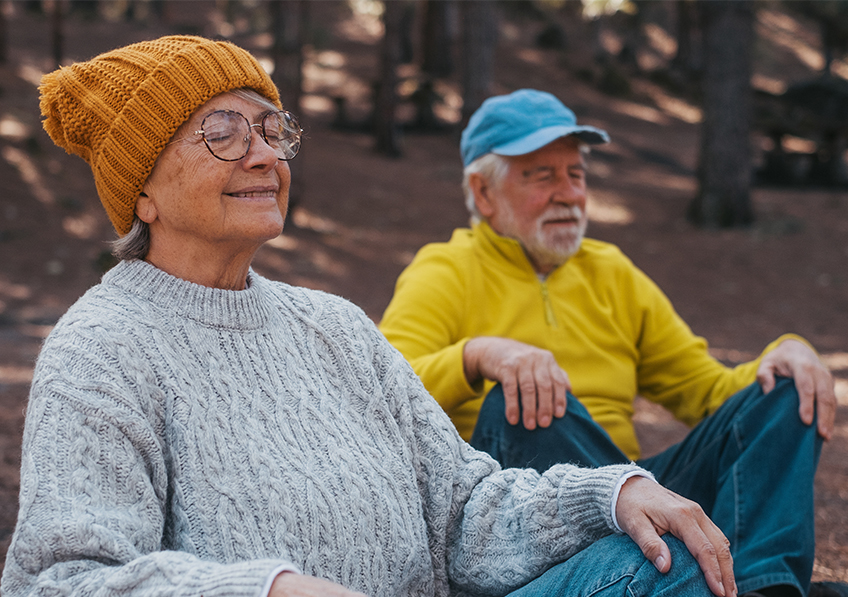 Learning mindfulness meditation would improve self-compassion, while health education would promote increased physical activity. © AdobeStock
Learning mindfulness meditation would improve self-compassion, while health education would promote increased physical activity. © AdobeStock
A team from Inserm and the University of Caen Normandy, in collaboration with researchers from the University of Jena (Germany) and University College London (United Kingdom), studied the potential benefits of interventions of meditation and health education for people experiencing a decline in their memory. This work is carried out as part of the European H2020 Silver Health Study program coordinated by Inserm(1). They show that learning mindfulness meditation would improve self-compassion, while health education would promote increased physical activity. These results, published in Alzheimer's & Dementia: Diagnosis, Assessment & Disease Monitoring, offer new avenues to support healthier aging.
“Subjective cognitive decline” is when the person reports feeling a deterioration in their cognitive faculties without this being apparent during standard cognitive tests. Studies have shown that these people have a higher risk of developing actual cognitive decline.
Previous work has concluded that mindfulness meditation and health education (a practice which consists of implementing prevention and care measures beneficial to one's health) would have a positive impact, still present at six months, on anxiety in people reporting subjective cognitive decline.
More generally, self-compassion (feeling of kindness towards oneself, feeling of common humanity and feeling of kindness towards negative thoughts) as well as physical activity have previously been associated with better mental health, itself associated with an improvement in general health, well-being and quality of life.
A European research group coordinated by Julie Gonneaud, Inserm researcher in the Pathophysiology and Imaging of Neurological Diseases laboratory (Inserm/University of Caen Normandy), Olga Klimecki, researcher at the University of Jena (Germany), and Nathalie Marchant, researcher at University College London (UK), studied the impact of eight weeks of mindfulness meditation and health education courses on self-compassion and physical activity among people reporting subjective cognitive decline.
The trial included 147 patients from specialist memory disorders clinics in France, Spain, Germany and the United Kingdom. One group followed the meditation classes for eight weeks, while the other took the health education classes. The impact of the interventions was evaluated by blood tests, cognitive assessments as well as questionnaires.
The researchers observed that participants who completed the mindfulness meditation training showed an improvement in their self-compassion. Participants who followed the health education training showed an increase in their physical activity. These changes were still present six months later.
These results argue in favor of complementary effects of the practice of mindfulness meditation and participation in health education programs on certain factors contributing to the improvement of mental well-being and lifestyle habits in older adults reporting subjective cognitive decline. The fact that these improvements appeared to be maintained after six months of follow-up suggests that these new skills and habits were integrated into the participants' lives.
According to Natalie Marchant, who led the trial, “More and more people are living to old age, and it is crucial that we find ways to support the mental and physical health of people as they age”.
“Self-compassion can be of great importance to older adults. It could improve psychological well-being to promote healthy aging”adds Olga Klimecki. “Our results represent an encouraging first step towards the implementation of a mindfulness-based intervention, which could be used to strengthen self-compassion in older adults. »
Julie Gonneaud completes: “Although physical activity has been scientifically linked to better physical, cognitive and mental health, how to promote it in daily life remains a challenge. Given the particularly deleterious effect of a sedentary lifestyle on the health of aging populations, showing that health education intervention programs can strengthen engagement in physical activity among older adults is particularly promising. for the promotion of healthy aging »she concludes.
(1) This work is funded by the European Union and is part of the SCD-Well study of the H2020 Silver Santé program (www.silversantestudy.eu), endowed with 7 million euros and coordinated by Inserm. The five-year Silver Santé study examines whether mental training techniques, such as mindfulness meditation, health education or language learning, can help improve mental health and the well-being of the aging population.

